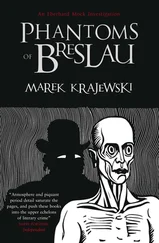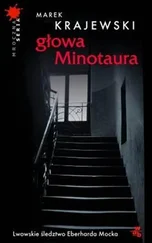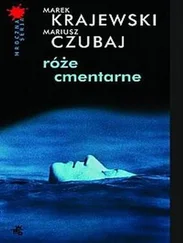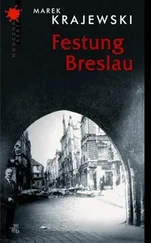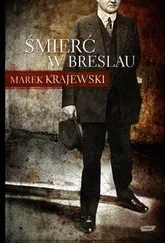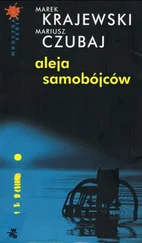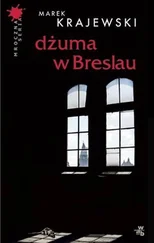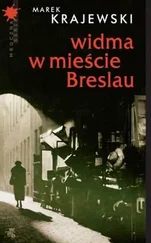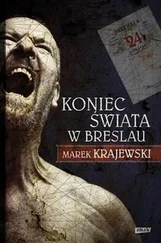Marek Krajewski - Death in Breslau
Здесь есть возможность читать онлайн «Marek Krajewski - Death in Breslau» весь текст электронной книги совершенно бесплатно (целиком полную версию без сокращений). В некоторых случаях можно слушать аудио, скачать через торрент в формате fb2 и присутствует краткое содержание. Жанр: Полицейский детектив, на английском языке. Описание произведения, (предисловие) а так же отзывы посетителей доступны на портале библиотеки ЛибКат.
- Название:Death in Breslau
- Автор:
- Жанр:
- Год:неизвестен
- ISBN:нет данных
- Рейтинг книги:3 / 5. Голосов: 1
-
Избранное:Добавить в избранное
- Отзывы:
-
Ваша оценка:
- 60
- 1
- 2
- 3
- 4
- 5
Death in Breslau: краткое содержание, описание и аннотация
Предлагаем к чтению аннотацию, описание, краткое содержание или предисловие (зависит от того, что написал сам автор книги «Death in Breslau»). Если вы не нашли необходимую информацию о книге — напишите в комментариях, мы постараемся отыскать её.
Death in Breslau — читать онлайн бесплатно полную книгу (весь текст) целиком
Ниже представлен текст книги, разбитый по страницам. Система сохранения места последней прочитанной страницы, позволяет с удобством читать онлайн бесплатно книгу «Death in Breslau», без необходимости каждый раз заново искать на чём Вы остановились. Поставьте закладку, и сможете в любой момент перейти на страницу, на которой закончили чтение.
Интервал:
Закладка:
“Are there a lot of insects there, Doctor?”
“Yes, a lot. Just imagine: a cold night, ragged crags, the sharp chimneys of bare rock, sand eating its way into everything, people in the rifts with faces like the Devil himself, wrapped in black cloaks, and, in the moonlight, snakes slithering and scorpions …”
“That’s the face of death …”
“What did you say, Inspector?”
“Sorry, nothing. You’re describing it so vividly, Doctor, that I felt the waft of death …”
“I too felt it many times in the Sahara. Fortunately, it did not sweep me away and I have been allowed to see them again.” Here, he pointed to a slim blonde and a seven-year-old boy who had unexpectedly entered the office.
“I’m very sorry, but I knocked twice …” said the woman with a clear Polish accent. Mock and Anwaldt stood up. Hartner looked at his loved ones tenderly. He stroked the boy on the head, who — evidently shy — was hiding behind his mother.
“It doesn’t matter, my dear. Allow me to introduce His Excellency, Director Eberhard Mock, the Chief of the Criminal Department of the Police Praesidium and his assistant Herr Herbert, Herbert …”
“Anwaldt.”
“Yes, Criminal Assistant Anwaldt. Allow me, sirs — this is my wife, Teresa Jankewitsch-Hartner, and my son, Manfred.”
Greetings were ceremoniously exchanged. The men bowed over the beautiful, slender hand of Frau Harnter. The boy bowed politely and gazed at his father who, apologizing to his guests, was speaking to his wife in a half-whisper. Frau Jankewitsch-Hartner, with her original beauty, stirred an intense yet somewhat differing interest in the two men: Mock was driven by the instinct of Casanova; Anwaldt, the contemplation of a Titian. This was not the first Polish woman to make such an impression on him. He sometimes caught himself thinking, absurdly, that the female representatives of that nation had something magical about them. “Medea was a Slav,” he thought at such moments. Looking at her delicate features, her turned-up nose and her hair tied back in a knot, listening to her amusingly soft “bitte”, he tried to liberate the noble contours of her body, the rounded curvature of her legs, the proud lift of her breasts, from her summer dress. Unfortunately, the object of their various, but perhaps basically similar, yearnings bade them farewell and left the office, tugging the shy boy with her. In the door, she passed the old, stooping librarian whose eyes lingered on her, something which did not escape the husband’s notice.
“Show me that register you’re lugging under your arm, Smetana,” Hartner said, not too kindly. The librarian, having done what was asked of him, returned to his duties while Harnter began to study Smetana’s sloping, Gothic calligraphy.
“Yes, dear sirs … For over a week now, Maass has been exclusively reading a fourteenth-century manuscript entitled Corpus rerum Persicarum . I’ll take this work for analysis tomorrow and compare the translation you photographed with the original. Today I’m going to work on the writing in the saloon carriage and that unfortunate Friedlander’s prophecies. I’ll also find something out about this Ibn Sahim. I might possibly have the first pieces of information the day after tomorrow. I’ll contact you, Criminal Director.” Hartner put on his spectacles and lost interest in his interlocutors. The search for pure truth entirely extinguished his oratorical-didactic passion. He turned his complete attention to the bloody writing and, muttering something to himself, put forward his first intuitive hypotheses. Mock and Anwaldt rose and said goodbye to the obliging scholar. The latter did not reply, occupied exclusively with his thoughts.
“He’s very polite, this Doctor Hartner. He must have a lot of responsibilities, yet he is ready to help us. How is that possible?” Anwaldt said, seeing that his first words provoked a strange smile on Mock’s face.
“My dear Herbert, he has a debt of gratitude to repay me. And one so great that he will not — I assure you — be able to repay it even with the most laborious scholarly expertise.”
IX
KANTH, SUNDAY, JULY 15TH, 1934
EIGHT O’CLOCK IN THE EVENING
Baron von Kopperlingk was taking a walk in the large park on his estate. The setting sun always awoke disturbing premonitions and unclear longings in him. The sharp, brassy cries of the peacocks strutting around the manor and the splashing of water in the pool where his friends were frolicking irritated him. The dogs’ barking annoyed him as did the untamed curiosity of peasant children whose eyes followed everything that happened behind the manor walls from trees and fences — even in the evenings and at night — like the eyes of animals. He loathed these impudent, unwashed brats who never averted their eyes and who, at the very sight of him, choked with mocking laughter. He glanced at the wall which surrounded the manor and thought he saw and heard them. Despite the rage which flared within him, he made his way to the manor with a distinguished gait. With the wave of a hand, he caught the attention of Josef, the butler.
“Where’s Hans?” he said coldly.
“I don’t know, your Lordship. Someone phoned him and he ran from the manor, very agitated.”
“Why didn’t you tell me about this?”
“I didn’t consider it fit to worry your Lordship during his walk.”
The Baron looked calmly at the old servant and counted to ten in his head. With great difficulty, he controlled himself and hissed:
“Josef, please pass on to me any information concerning Hans, be it — in your eyes — of the least importance. If you don’t in future do this, even once, you’ll be begging in front of the Church of the Sacred Heart.”
The Baron ran out to the drive and, facing the setting sun, shouted the name of his favourite butler several times. Hostile eyes answered him from the fence. He set off as fast as his legs could carry him towards the iron gates. The jeering looks pursued him; the evening air thickened. “Hans, where are you?” yelled the Baron. He tripped on even ground: “Hans, where are you? I can’t get up.” The evening air thickened; lead thickened in the Baron’s body. From behind the manor wall flashed the barrels of machineguns. Bullets whistled into the gravel alley, kicked up clouds of dust, wounded the Baron’s delicate body, did not allow him either to get up or to fall to the ground. “Where are you, Hans?”
Hans was sitting next to Max Forstner in the back of the parked Mercedes, its engine still running. He was weeping. His sobs reached a crescendo when two men with smoking machineguns ran up to the car. They took the front seats. The car moved off with a screech.
“Don’t cry, Hans,” Forstner said with concern. “You simply saved your life. Besides, I saved mine, too.”
BRESLAU, THAT SAME JULY 15TH, 1934
EIGHT O’CLOCK IN THE EVENING
Kurt Wirth and Hans Zupitza knew that they could not refuse Mock. These two bandits, before whom the entire criminal world of Breslau shook, had a double debt of gratitude owing to “good Uncle Eberhard”. Firstly, he had saved them from the noose; secondly, he had allowed them to carry on with dealings both profitable and completely at odds with German law. In exchange, he sometimes asked them to do that which they did best.
Wirth had met Zupitza twenty years earlier, in 1914, on the freight ship Prinz Heinrich , which sailed between Danzig and Amsterdam. They became friends without the use of unnecessary words — Zupitza was a mute. The clever, short and slim Wirth, ten years his elder, took the twenty-year-old mute giant under his wing and did not regret his decision a month later when Zupitza saved his life for the first time. It happened in a tavern in Copenhagen. Three drunk, Italian sailors wanted to teach the small, thin German some good manners — meaning how to drink wine. This cultural education entailed pouring gallons of sour Danish plonk down Wirth’s throat. When he was already on the floor, drunk, the Italians decided that they would not be able to civilize that Kraut anyway so it would be better if such a cad disappeared from the face of the earth altogether. They had begun enforcing this decision with the help of broken bottles when into the inn came Zupitza who, a moment earlier, had almost brought down the wooden privy where he had got his hands on one of the numerous girls who comforted sailors in Copenhagen. He had not, however, lost all of his energy in her arms. A few seconds later, the Italians had stopped moving. The following day, the gloomy waiter — whose countenance over time would frighten many — shook like jelly when, questioned by the police, he tried to put across in his unskilled tongue the sound of skin cracked open, the shattering of glass, the moans and the wheezing. When Wirth came to, he weighed out the pros and cons and in Amsterdam abandoned the sailor’s profession for ever. The inseparable Zupitza likewise disembarked permanently on to terra firma . Yet they did not break all contact with the sea. Wirth devised a means of survival not known in Europe at the time: extortion from port smugglers. The pair formed an efficient mechanism whereby Wirth was the brain, Zupitza the muscle. Wirth would lead the negotiations with the smugglers; if these proved not to be submissive, Zupitza would kidnap and murder them, using methods invented by Wirth. Soon all the police in post-war Europe were looking for them: in the docks of Hamburg and Stockholm, where they left their victims’ mutilated remains; in the brothels of Vienna and Berlin, where they spent mountains of increasingly worthless marks. They felt the chase on their backs. Chance associates began to betray them more and more frequently in exchange for worthless promises. Wirth had a choice: either to leave for America, where the Mafia awaited them, bloodthirsty and ruthless competition in the field of extortion, or to find a quiet and peaceful place in Europe. The first choice was very dangerous, the second virtually impossible, since European policemen everywhere, dreaming of fame, carried photographs of both bandits in their pockets.
Читать дальшеИнтервал:
Закладка:
Похожие книги на «Death in Breslau»
Представляем Вашему вниманию похожие книги на «Death in Breslau» списком для выбора. Мы отобрали схожую по названию и смыслу литературу в надежде предоставить читателям больше вариантов отыскать новые, интересные, ещё непрочитанные произведения.
Обсуждение, отзывы о книге «Death in Breslau» и просто собственные мнения читателей. Оставьте ваши комментарии, напишите, что Вы думаете о произведении, его смысле или главных героях. Укажите что конкретно понравилось, а что нет, и почему Вы так считаете.

